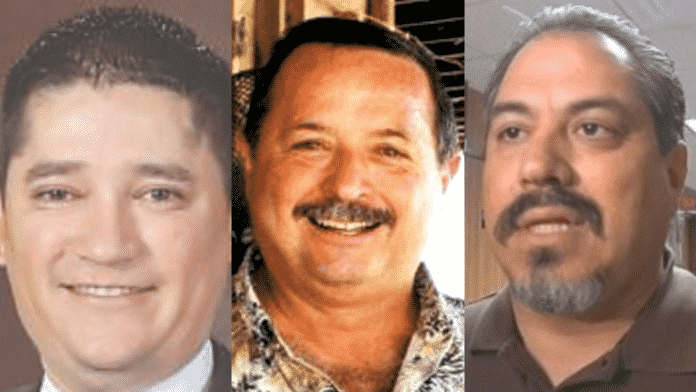The trial of three men accused of bilking the city of Weslaco out of millions of dollars during the rehabilitation of its water treatment facilities has again been postponed — two years after the charges first came to light.
The three men — former Hidalgo County Precinct 1 Commissioner Arturo “A.C.” Cuellar, Weslaco businessman Ricardo Quintanilla and Daniel J. Garcia, an attorney from Rio Grande City — will now have to wait until September for their day in court.
Jury selection has been rescheduled to Sept. 8, while opening statements are expected to begin the following week, on Sept. 13.
The trial of the three men has been delayed numerous times over the last year due to the ongoing COVID-19 pandemic. And it was the pandemic, again, that played a primary role in U.S. District Judge Micaela Alvarez’s decision to announce another postponement during a status conference in federal court Thursday.
“Back when I gave you this April setting, I was really hopeful and probably said as much back then,” Alvarez said about the April 26 trial date she had set earlier this year.
“And month to month, I’m always hopeful. And at some point in time, I should probably give up being hopeful,” she said.
Though the McAllen federal courthouse has recently resumed criminal trials, those have been limited to cases with single defendants.
The Weslaco water plant trial, however, involves three defendants, numerous witnesses, and what both prosecutors and defense attorneys have repeatedly referred to as “voluminous evidence.”
Cuellar, Quintanilla and Garcia stand accused of conspiring together — along with a handful of other named and unnamed co-conspirators — to funnel millions of dollars from the water plant project to their own pockets.
Prosecutors allege the men participated in a pay-to-play scheme where Weslaco public officials were paid bribes in order to secure the city commission’s favorable votes on a host of engineering and construction contracts related to the project.
The charges initially came to light in the spring of 2019, when former Rio Grande City Municipal Judge Leonel Lopez Jr. and Gerardo “Jerry” Tafolla — who was then a sitting Weslaco city commissioner — each pleaded guilty to federal programs bribery.
Not long after, prosecutors unsealed a 74-count superseding indictment against Cuellar, Quintanilla, Garcia and a fourth man — former District 2 Weslaco commissioner John Cuellar. The two Cuellars are cousins.
Though he initially pleaded not guilty to some 61 separate charges, John Cuellar later reached a deal with the government and changed his plea to guilty.
The trial against the remainder of the defendants, however, got its first delay early on, when Alvarez declared the case “complex” — a designation that extends certain limitations of the Speedy Trial Act.
Then the COVID-19 pandemic prompted numerous delays throughout last year, as did the death of one of the government’s key witnesses, Leo Lopez.
Last Tuesday, Garcia — through his attorney, Christopher Sully — filed a motion arguing that the pandemic continues to pose limitations on the court’s ability to safely hold trial.
Sully further expressed concern that the pandemic would adversely impact the defense’s capability to draw a representative jury pool since an abnormally high number of prospective jurors may seek to be excused from service due to health concerns.
On Thursday, prosecutors also revealed new information about what the trial will ultimately look like.
Though the government is expected to call numerous witnesses to the stand, none of them will be so-called expert witnesses.
The news came to light in the government’s response to the defense’s inquiries about such expert witnesses, and prosecutors’ own desire to learn what experts the defense has lined up.
“We have not turned over any expert witnesses because we are not going to call an expert witness,” said Peter M. Nothstein, a trial attorney with the Department of Justice’s Public Integrity Section.
“(A) request has been made from the defense to know of our expert disclosures. I’m representing now, there is no expert disclosure. Our disclosure is nothing, essentially. That satisfies our obligation,” he added a moment later.
In mentioning the government’s “obligation,” Nothstein was referring to Rule 16 of the Rules of Federal Criminal Procedure, which outlines when the government and defense must disclose certain information to the opposing side.
Nothstein argued that his announcement that prosecutors have no plans to call expert witnesses triggered the defense’s obligation under Rule 16 to disclose their own list of potential rebuttal expert witnesses.
But the judge was not ready to agree with the prosecutor. Instead, she put off making a ruling on the matter until a later date.




